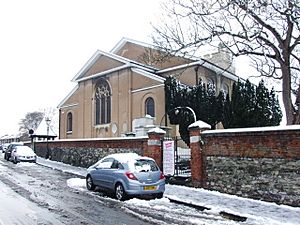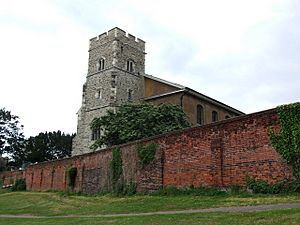St. Margaret's Church, Rochester facts for kids
Quick facts for kids St Margaret's Church, Rochester |
|
|---|---|
| Parish Church of St Margaret of Antioch | |

East end in winter, viewed from St. Margaret's Street
|
|
| Lua error in Module:Location_map at line 420: attempt to index field 'wikibase' (a nil value). | |
| Location | Rochester, Kent |
| Country | England |
| Denomination | Anglican |
| Website | www.parishofrochester.org.uk |
| History | |
| Status | Chapel of Ease |
| Architecture | |
| Functional status | Active |
| Heritage designation | Grade II |
| Designated | 24 October 1950 |
| Architectural type | Church |
| Specifications | |
| Materials | ragstone (tower) and rendered brick (church) |
| Bells | 8 (full circle) |
| Tenor bell weight | 9 long cwt 2 qr 8 lb (1,072 lb or 486 kg) |
| Administration | |
| Parish | St Peter with St Margaret |
| Deanery | Rochester |
| Diocese | Rochester |
| Province | Canterbury |
St Margaret's Church, Rochester is a historic church located in Rochester, England. It is now a Chapel of Ease for the parish of St Peter with St Margaret. A Chapel of Ease is a church building that helps a main parish church by serving people who live far away.
Before this, it was the main parish church for an area called St Margaret's Without. This name meant it was outside the old city walls of Rochester. The church building is very important historically, and it is listed as a Grade II* building by English Heritage. This means it is a particularly important building of more than special interest.
Contents
History of St Margaret's Church
The first time St Margaret's Church is mentioned in history is in a document from 1108. This document was written by Bishop Gundulf. For many years, St Margaret's was a smaller chapel connected to the parish of St Nicholas. At that time, the main altar for St Nicholas was actually inside Rochester Cathedral.
Early Ownership and Changes
During the time of King Richard I (who ruled from 1189 to 1199), a bishop named Gilbert de Glanville gave the church to a hospital he owned. However, after some disagreements, the monks of Rochester got control of the church back in 1255.
For a long time, the priests (called vicars) at St Margaret's only received a small yearly payment. But in 1401, a new agreement gave the church its own land and money to support the vicar. In 1488, the monks finally gave up all control, leaving the bishop in charge of church matters.
During the English Reformation around 1540, the church became the property of the King. Later, it was given to the new Dean and Chapter of Rochester Cathedral.
Building Through the Years
The oldest part of the church building that still stands today is the tower. It was either built or fixed up in 1465. The original medieval church had a main area (nave) and two smaller chapels. None of these older parts remain today.
In the 1600s, during the reign of Charles II of England, people found a crown "set round with precious stones" buried in the churchyard. Locals believed a Saxon King might have been buried there!
The area around the church used to be countryside. But in the 1700s and 1800s, the city of Rochester grew, and more houses were built in the church's parish. The old medieval church became too small for all the new people.
So, in 1823, they started rebuilding the church. The main part (nave) was finished in 1824. A few years later, most of the old medieval parts, except the tower, were taken down. By 1840, the church looked much like it does today. A new large window was added in 1872.
Inside, changes were also made. The tall pulpit was moved and lowered in 1872. The old box pews (seats with high sides) were removed. The original organ was replaced, and then replaced again in 1877 with the current organ.
Recent Times
Later, the parishes of St Margaret and St Peter joined together. St Margaret's then became a Chapel of Ease again. The church roof was badly damaged in storms in 1987 and 1990. People thought the church might have to close. But local people worked hard to save it, and over £100,000 has been spent to improve the inside of the building.
Church Architecture
Outside the Church
From the outside, the main part of the church looks like a typical 19th-century building. It's mostly a rectangle with brick walls covered in a smooth finish. The roof is low and made of slate. The side windows are made of iron, with separate windows for the ground floor and the gallery above. The East end has a large, beautiful window from 1872, designed in a Neo-gothic style.
The West end of the church is dominated by the old medieval stone tower. It's made of rough stone with flint details. The tower has three main levels and a crenellated top, which looks like the top of a castle wall. Inside the tower, there's an old ringing room and a bell room. A small staircase in the corner leads up to these rooms and the roof.
There's a special gate called a lych gate to the south of the church. It leads into the graveyard. Some old gravestones have been used to make a path. The graveyard offers great views across the Medway valley. In 2008, the tower was repaired, and its roofs were replaced.
Inside the Church
The inside of the church was designed in 1824. It's mostly a rectangular space. The sides have galleries (upper levels) that make it feel like it has a cross shape, even though it doesn't. The wooden columns supporting the galleries are designed in old Greek styles.
The base of the tower is a few steps lower than the main church area. This is where the bells are rung from today. The choir stalls, where the choir sits, were put in in 1898. In recent years, a kitchen and a restroom have been added at the West end of the church. New heating has also been installed.
Famous Connections
St Margaret's Church has been connected to several interesting people:
- Captain Charles John Moore Mansfield: He was a naval captain who fought in the famous battle of Trafalgar. He has a memorial inside the church.
- John Newton: He was once involved in the slave trade but later became a priest and worked to end slavery. He wrote the famous hymn "Amazing Grace". He was married in the medieval church in 1750.
- Russell Thorndike: An actor and children's author, he was born while his father was the Vicar (priest) of St Margaret's.
- Dame Sybil Thorndike: A very famous actress, she was Russell's sister. Her father was also the Vicar of St Margaret's, and Sybil used to teach in the Sunday School there.
Church Music
The Organ
The church has an organ that was originally built in 1877. It was later updated and made bigger in 1902. The organ has different sets of pipes that make various sounds, like a deep bass sound and brighter, higher notes.
The Bells
St Margaret's Church has a set of eight bells. The heaviest bell weighs about 9.5 long tons. They are rung in the English style, which means they swing in a full circle.
Records show there were five bells in 1552. The oldest bell still in use today is from 1621. Over the centuries, bells have been recast (melted down and made new) or new ones added. In 1896, two new bells were added, making the current set of eight.
For about 25 years in the late 1900s, the bells couldn't be rung. But in 2005-2006, a big project took place. The bells were taken down, retuned at a special bell foundry, and rehung in a new frame. Now, they are rung from the ground floor of the church.
 | Roy Wilkins |
 | John Lewis |
 | Linda Carol Brown |





